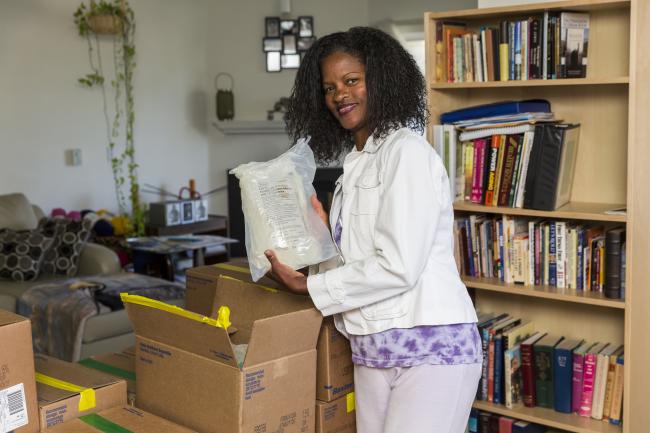World Kidney Day 2017
Des Moines resident Fatima Valentine opens boxes of materials that allow her to do kidney dialysis in her apartment.
Tue, 03/07/2017
By Cynthia Flash
For many people with challenging illnesses, there is a “before” and an “after.
” They recall life before a diagnosis or scary event, and life after.
For Fatima Valentine of Des Moines, the turning point came in November 2015. Then age 50, she had battled high blood pressure for 30 years. She usually felt pretty good even though she didn’t always get around to taking her medicine. But lately she had been having trouble sleeping and was short of breath. Her family, in town for Thanksgiving, pushed her to see her doctor.
Still she didn’t get around to her own health care – until a neighbor walking her dog saw Valentine sitting outside her door, looking not quite right. The neighbor urged a call to 911. At Highline Hospital, Valentine was diagnosed with chronic kidney failure.
Years of uncontrolled blood pressure had taken their toll on Valentine's kidneys, slowly but surely damaging their ability to function. With almost no kidney function remaining, she needed regular dialysis or an organ transplant. There were no other options to rid her body of the waste her kidneys could no longer process – and to keep her alive.
She went to Northwest Kidney Centers’ SeaTac dialysis clinic three times a week, each time spending four hours connected by tubes to a machine that cleaned her blood. In a few months she transitioned to self-dialysis, which she does every night at home. Her health has stabilized to a degree that she’ s able to walk, hike, play tennis and continue to work as a legal assistant at AT&T.
March is National Kidney Month, a time to learn the risk factors that cause chronic kidney disease, which affects more than 10 percent of American adults at varying levels of severity. Valentine is living proof that it’ s possible to live an active life despite kidney disease.
She wants everyone to know how important it is for people with high blood pressure to take their medicine as their doctor prescribes.
“I love telling people what I'm going through to try to help others avoid it,” she said. “Diabetes is the No. 1 cause of kidney disease and high blood pressure is No. 2. I was No. 2. I ask all my friends, ‘ how is your blood pressure?’” she said.
Valentine said she encourages her friends to stay on their blood pressure medication. “I find that a lot of people are doing what I was doing and not staying on it. I tell them, ‘ don't do that. Stay on your medication,’” she said. “I had symptoms. I would go to the doctor, get medication, then go off medication. I understand how they feel. They want to do the natural thing, and just exercise without changing the rest of their lifestyle.
“But they need to get on top of it. High blood pressure and even kidney disease is not a death sentence. You can still be active. People are shocked when they see me riding my bike. They say, ‘ do your doctors say you can do that?’ I say they encourage it! I try to warn people to not do what I did.
”Here are other tips to keep kidneys healthy:
1. Have your kidneys checked regularly.
2. Work with your doctor to monitor your blood pressure.
3. If you have diabetes, control your blood sugar to keep it within normal range.
4. Avoid or limit over-the-counter anti-inflammatory drugs such as ibuprofen and Aleve.
5. Eat less salt – no more than 2,000 milligrams of sodium per day. That means paying attention to salt hidden in processed food.
6. Exercise. Using your muscles can keep your kidneys healthy.
7. Don’ t smoke. If you smoke, quit.
If you have questions, check out Northwest Kidney Centers’ website, www.nwkidney.org.


